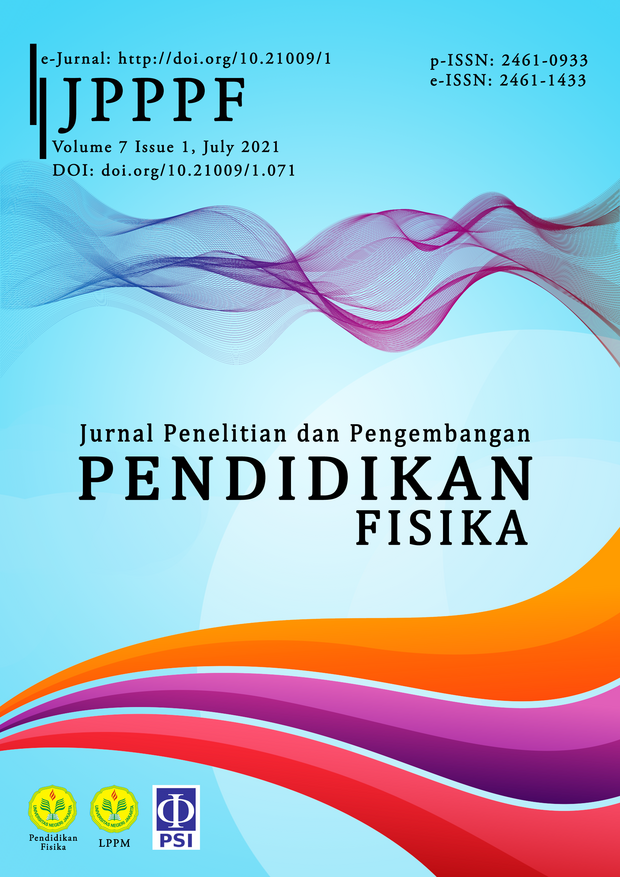Comparison of Basic Science Process Skills for Students on Electrical Materials with the Rasch Model Analysis
Abstract
Prospective teacher students must have good science process skills to create learning that focuses on science process skills-based learning. This study aims to describe the comparison of the basic science process skills of prospective elementary school teachers in electric subjects. This research is descriptive. The sample of this study was 184 students consisting of 104 students in the 4th semester and 80 students in the 6th semester. The data collection technique was using a test that consists of 25 questions about basic science process skills. Data analysis using the Wright Person Map in Rasch Model. Based on the results, the researcher obtained information that most prospective elementary teachers' science process skills were classified as moderate. In addition, the results were obtained that the science process skills of 6th-semester students were better than the 4th semester. This research also found that the science process skill of female students was better than male students.
References
Abungu, HE, Okere, MIO & Wachanga, SW 2014, ‘The Effect of Science Process Skills Teaching Approach on Secondary School Students’, Achievement in Chemistry in Nyando District, Kenya, Journal of Educational and Social Research, vol. 4, no. 6, pp. 359-372.
Ango, M 2002, ‘Mastery of Science Process Skills and Their Effective Use in the Teaching of Science: An Educology of Science Education in the Nigerian Context’, International Journal of Educology, vol. 16, no. 1, pp. 11-30.
Anisa, TM, Supardi, KI & Sedyawati, SMR 2014, ‘Keefektifan Pendekatan Keterampilan Proses Sains Berbantuan Lembar Kerja Siswa Pada Pembelajaran Kimia’, Jurnal Inovasi Pendidikan Kimia, vol. 8, no. 2, pp. 1398-1408.
Aydogdu, B 2015, ‘The investigation of Science Process Skills of Science Teachers in Terms of Some Variables’, Educational Research and Reviews, vol. 10, no. 5, pp. 582-594.
Geramipour 2021, ‘M. Rasch testlet model and bifactor analysis: how do they assess the dimensionality of large-scale Iranian EFL reading comprehension tests?’, Lang Test Asia, vol. 11, no. 3.
Gultepe, N 2016, ‘High School Science Teachers’ Views on Science Process Skills’, International Journal of Environmental and Science Education, vol. 11, no. 5, pp. 779-800.
Haniah, F, Annisa, M & Kartini 2018, ‘Pengembangan Instrumen Tes Berbasis Keterampilan Proses Sains Pada Materi Benda dan Sifatnya Kelas V DN 010 Tarakan’, Widyagogik, vol. 6, no. 1, pp. 29-46.
Hernawati, D et al. 2018, ‘Integration of Project Activity to Enhance the Scientific Process Skill and Self-efficacy in Zoology of Vertebrate Teaching and Learning’, Eurasia Journal of Mathematics, Science and Technology Education, vol. 14, no. 6, pp. 2475-2485.
Ilmi, N et al. 2016, ‘Pengembangan Instrumen Penilaian Keterampilan Proses Sains Pada Pembelajaran Fisika SMA’, In Prosiding Seminar Nasional Fisika. pp. 57-62.
Karamustafaoğlu, S 2011, ‘Improving the Science Process Skills Ability of Science Student Teachers Using I Diagram’, Eurasia J. Phys. Chem. Rduc, vol. 3, no. 1, pp. 26-38.
R. Haryadi & H. Pujiastuti 2019, ‘Discovery Learning based on Natural Phenomena to Improve Students’ Science Process Skills’, Jurnal Penelitian & Pengembangan Pendidikan Fisika, vol. 5, no. 2, pp. 183 – 192.
Rahayu, AH & Anggraeni, P 2017, ‘Analisis Profil Keterampilan Proses Sains Siswa Sekolah Dasar di Kabupaten Sumedang’, Jurnal Pesona Dasar, vol. 5, no. 2, pp. 22-33.
Ratnasari, D, Sukarmin & Suparmi 2017, ‘Analisis Implementasi Instrumen Two-Tier Multiple Choice Untuk Mengukur Keterampilan Proses Sains’, Jurnal Pendidikan dan Kebudayaan, vol. 2, no. 2, p. 166.
Rauf, RAA et al. 2013, ‘Inculcation of Science Process Skills in a Acience Classroom.’, Asian Social Science, vol. 9, no. 8, pp. 47-57.
Rustaman, N et al. 2005, ‘Strategi Belajar Mengajar Biologi’, Malang: UM Press.
Sari, IN, Idham, A & Riska 2017, ‘Kontribusi Keterampilan Proses Sains Siswa Terhadap Hasil Belajar Ssiswa Pada Materi Wujud Zat dan Perubahannya’, Jurnal Pendidikan Informasi dan Sains, vol. 6, no. 2, pp. 257-266.
Sayekti, IC & Kinasih, AM 2017, ‘Kemampuan Guru Menerapkan Keterampilan Proses Sains dalam Pembelajaran IPA Pada Siswa Sekolah Dasar’, Profesi Pendidikan Dasar, vol. 4, no. 1, pp. 97-105.
Shahali, EHM, Halim, L, Treagust, DF et al. 2017, ‘Primary School Teachers’ Understanding of Science Process Skills in Relation to Their Teaching Qualifications and Teaching Experience’, Res Sci Educ, vol. 47 pp. 257–281.
Subagyo, Y, Wiyanto & Marwoto, P 2009, ‘Pembelajaran Dengan Pendekatan Keterampilan Proses Sains Untuk Meningkatkan Penguasaan Konsep Suhu Dan Pemuaian’, Jurnal Pendidikan Fisika Indonesia, vol. 5, no. 1, pp. 42-46.
Widayanti, EY 2015, ‘Penguasaan Keterampilan Proses Sains Dasar Siswa Madrasah Ibtidaiyah (Studi Pada Madrasah Mitra STAIN Ponorogo)’, Kodifikasia, vol. 9, no. 1, pp. 171-198.
Zainab, S & Wilujeng, I 2016, ‘Pengembangan Instrumen Penilaian Tes Objektif Pilihan Ganda untuk Mengukur Penguasaan Materi Ajar Gerak Lurus dan Keterampilan Proses Sains Siswa SMA’, Jurnal Pendidikan Fisika, vol. 5, no. 2, pp. 106-113.
Copyright (c) 2021 Sri Lestari Handayani

This work is licensed under a Creative Commons Attribution 4.0 International License.











